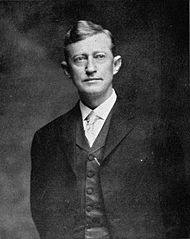Malcolm R. Patterson
| Malcolm R. Patterson | |
|---|---|
 |
|
| 30th Governor of Tennessee | |
|
In office January 17, 1907 – January 26, 1911 |
|
| Preceded by | John I. Cox |
| Succeeded by | Ben W. Hooper |
| Member of the U.S. House of Representatives from Tennessee's 10th district |
|
|
In office March 4, 1901 – November 5, 1906 |
|
| Preceded by | Edward W. Carmack |
| Succeeded by | George Gordon |
| Personal details | |
| Born |
June 7, 1861 Somerville, Alabama |
| Died | March 8, 1935 (aged 73) Sarasota, Florida |
| Resting place | Forest Hill Cemetery Memphis, Tennessee |
| Political party | Democratic |
| Spouse(s) | Sarah Johnson Sybil Hodges (1903–1906, her death) Mary Russell Gardner (m. 1907) |
| Relations |
Josiah Patterson (father) Virginia Foster Durr (niece) |
| Profession | Attorney |
Malcolm Rice Patterson (June 7, 1861 – March 8, 1935) was an American politician and jurist. He served as Governor of Tennessee from 1907 to 1911, and served in the U.S. House of Representatives from 1901 to 1906. He later served as a circuit court judge in Memphis (1923–1934), and wrote a weekly column for the Memphis Commercial Appeal (1921–1933).
Patterson was one of Tennessee's most controversial governors. While praised for quelling the Night Riders of Reelfoot Lake uprising in 1908, he was accused of issuing pardons to political allies, most notably his advisor Duncan Cooper, who had been convicted of murdering his political foe Edward W. Carmack. Patterson's veto of a popular prohibition bill in 1909 and his attempts to control the state Democratic primaries in 1910 created a division in the party that allowed Ben W. Hooper to become the first Republican governor elected in the state in nearly 30 years.
Patterson was born on June 7, 1861 as Hamilton Rice Patterson in Somerville, Alabama, the son of Colonel Josiah Patterson (1837–1904), a Confederate cavalry officer and congressman, and Josephine (Rice) Patterson. In 1866, his father changed his first name to "Malcolm." The family moved to Memphis, Tennessee, in 1872, where Patterson would graduate from Christian Brothers College (now Christian Brothers University). He studied at Vanderbilt University in the early 1880s, and read law with his father. He was admitted to the bar in 1883.
Patterson served as attorney general for Shelby County from 1894 to 1900, when he was elected to the United States House of Representatives. He represented his father's old district, the former Tenth District, from 1901 to 1906.
...
Wikipedia
